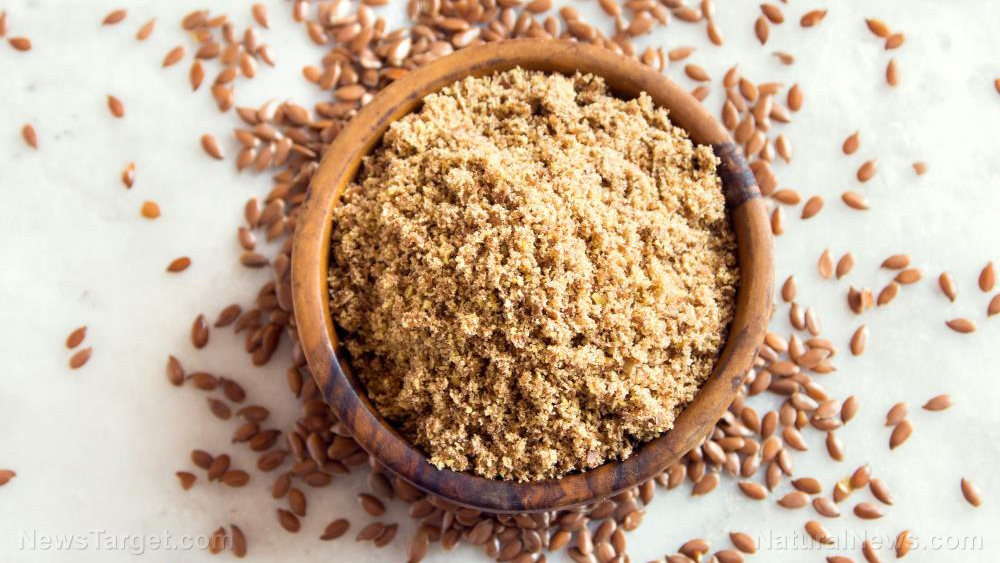Grind them: Get the most benefit from flaxseeds by taking this extra step
04/10/2019 / By Zoey Sky

Flaxseeds are a superfood with several science-backed health benefits. Full of nutrients, flaxseeds can help lower your cancer risk. But did you know that it’s better to consume ground instead of whole flaxseeds?
Flaxseeds are one of the oldest crops. There are two types – brown and golden flaxseed – but both are equally nutritious. A typical serving size for ground flaxseeds is one tablespoon (seven grams), which contains the following nutrients:
- Omega-3 fatty acids (1,597 mg)
- Vitamin B1 (8 percent of the recommended daily intake [RDI])
- Magnesium (7 percent of the RDI)
- Phosphorus (4 percent of the RDI)
- Calcium (2 percent of the RDI)
- Folate (2 percent of the RDI)
- Iron (2 percent of the RDI)
- Potassium (2 percent of the RDI)
- Vitamin B6 (2 percent of the RDI)
Why are ground flaxseeds better for you?
It is best to grind flaxseeds before eating or cooking with them. According to Brierley Horton, a registered dietitian, the human body is unable to fully digest whole flaxseed.
To reap all of the heart-healthy benefits of flaxseeds, break them down by chopping or grinding them. (Related: 10 Healthy reasons to add flaxseed to your diet.)
To grind flaxseeds, use a handheld mill, a traditional spice grinder, or a mortar and pestle. If you want to maximize the health benefits of flaxseeds but you don’t have any of these tools, you can also purchase ground seeds.
Do keep in mind that it’s better to grind fresh flaxseed. Pre-ground flaxseed isn’t as beneficial as freshly ground seeds since most of the healthy compounds start to oxidize after the seeds are ground. Consume flaxseeds within 24 hours of grinding.
Sprinkle some ground flaxseed over cold or hot breakfast cereal or add it to your batter when baking.
The health benefits of flaxseeds
Here are several reasons to add freshly ground flaxseeds to your meals.
Flaxseeds are full of dietary fiber.
If you want to improve your digestive health, consume more ground flaxseed. A tablespoon has three grams of fiber, which is about eight to 12 percent of the daily recommended intake for men and women, respectively.
Additionally, flaxseeds contain two types of dietary fiber: soluble (20 to 40 percent) and insoluble (60 to 80 percent). These types of fiber get fermented by the bacteria in your large bowel and they help bulk up stools. This results in more regular bowel movements.
Soluble fiber increases the consistency of the contents of the intestine and slows down your digestion rate. This can help regulate blood sugar and lower cholesterol.
Meanwhile, insoluble fiber allows more water to bind to stool, which increases its bulk and results in softer stools. You need insoluble fiber to prevent constipation. This type of fiber is also crucial for those who have irritable bowel syndrome (IBS) or diverticular disease.
Flaxseeds are full of lignans that can help lower your cancer risk.
Lignans are plant compounds with antioxidant and estrogen properties that can both help lower cancer risk and boost your overall well-being. In fact, flaxseeds have at least 800 times more lignans than other plant foods.
Data from observational studies suggest that people who consume flaxseeds have a lower risk of breast cancer, especially among postmenopausal women.
Meanwhile, in a small study that involved 15 male participants, volunteers who consumed 30 grams of flaxseeds daily while following a low-fat diet had reduced levels of a prostate cancer biomarker.
Flaxseeds are full of omega-3 fats.
People who are vegetarian, or those who don’t eat fish, can get their omega-3s from flaxseeds. The seeds are full of alpha-linolenic acid (ALA), a mostly plant-based omega-3 fatty acid.
Data from a Costa Rican study, which involved 3,638 participants, revealed that those who consumed more ALA had a lower risk of heart attack compared to those who consumed less of it.
In a large review of 27 studies that involved over 250,000 people, researchers discovered that ALA was associated with a 14 percent lower risk of heart disease. Several studies have also linked ALA to a lower risk of stroke.
If you want to improve your digestive health and lower your cancer risk, add more ground flaxseeds to your diet.
Sources include:
Submit a correction >>
Tagged Under:
This article may contain statements that reflect the opinion of the author
RECENT NEWS & ARTICLES
COPYRIGHT © 2017 SUPER FOODS NEWS





















